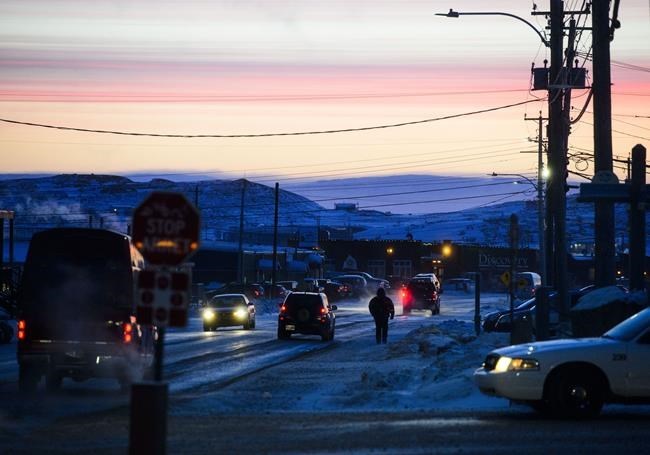
People make their way through Iqaluit, Nunavut, on Wednesday, March 6, 2019. Fireworks exploded over Frobisher Bay off the shores of this northern capital the night Nunavut was born while sled dogs chained on the sea ice below howled and barked. As the territory marks its 20th anniversary on Monday, Premier Joe Savikataaq says there are more fireworks to come. THE CANADIAN PRESS/Sean Kilpatrick
March 31, 2019 - 7:00 AM
IQALUIT, Nunavut - Fireworks exploded over Frobisher Bay while sled dogs chained to the sea ice howled and barked in the new capital of Iqaluit the night Nunavut was born.
The territory marks its 20th anniversary on Monday and Premier Joe Savikataaq says there are more fireworks to come.
"We have lots of good-news stories," he says, pointing with pride to a growing economy and a better-educated, more confident populace.
But there's plenty of barking, too.
"We could have done a lot better," says Madeleine Redfern, Iqaluit's outspoken mayor, who worries about a growing gap between well-off Inuit and those left behind.
Some, like Aluki Kotierk, head of the group that administers the Nunavut land claim, says the territory may no longer serve the interests of the people it was created for. Nunavut Tunngavik Inc. is considering self-government for Inuit, separate from the territory.
"We think Inuit life would be in a much better position in terms of social, cultural and economic well-being if (the land claim) had been implemented effectively," Kotierk says. "We're taking an exercise to see what our options are."
Savikataaq's economic optimism isn't misplaced.
Nunavut, with four mines either operating or expanding, has the fastest-growing economy in Canada. The Conference Board of Canada, calling it unprecedented, predicts nine per cent growth this year.
Mines are located throughout the territory, spreading the benefits around. And although fewer Inuit work at those mines than hoped, renegotiated agreements have committed mining companies to spend millions on training and recruiting.
School graduation rates are slowly climbing and over half the students who start school now complete it.
Big-budget public works are opening the territory up.
Iqaluit has a modern new airport and a deep-sea port is being built. Small-craft harbours in far-flung communities are creating opportunities for industries such as fishing, as well as making day-to-day life easier and safer.
A healing-focused correctional facility has opened in Rankin Inlet. Health centres have been built in outlying communities. A long-awaited substance abuse treatment centre is finally promised for Iqaluit.
A major Arctic research facility is operating in Cambridge Bay.
But not all Inuit are along for the ride, says Redfern.
Those who don't fit in to English, southern-based education — Nunavut uses Alberta's curriculum — or don't have the skills to work in mining often face poverty, especially when housing subsidies for government employees inflate rents for everyone.
"That's a huge contributing factor — the cost of housing and the fact it's gone up tremendously," Redfern says.
Nunavut continues to face a tangled knot of interwoven social problems. Poverty, poor housing, ill health, unemployment and undereducation all feed into each other. This year, the territory needs about 3,300 housing units and plans to build 83.
Even the language and culture that Nunavut was created to nurture is failing, Kotierk says. She describes the territory's school dropout rate as a "push-out rate" as students reject classroom materials that don't reflect them.
Nunavummiut are still coping with the immense changes the last 50 years have brought, she says.
"The expectation that Inuit should be able to get over it doesn't help us. It's unfair for a society that has gone through their own great changes in a much slower pace to expect us to be able to adjust as quickly as we do."
Still, Redfern says, the sun is slowly creeping over Nunavut's horizon.
"There's so much activity that's happening here — the fisheries sector, the arts sector ... The main issue is seeing the work that needs to be done to ensure that those who are struggling are able to participate."
Savikataaq says Inuit are eager to catch up to development in southern Canada.
"People are resilient and quite hopeful. When negative or bad stuff comes along, we just take it as it goes and say, 'We'll deal with this.'"
Savikataaq recently went hunting near Arviat, hoping to bring home a caribou or two. He had just bought a new snowmobile and was giving it its first field test.
It conked out.
"My son had to put another snowmobile on a sled and drive 250 miles and come and exchange Ski-Doos."
Savikataaq will get the faulty machine running. Maybe the territory he leads is much the same — balky at first, but with some work it'll fly.
"We have a lot of potential here," he says.
"We're proud Canadians. We just want Canada to know that we're a part of it."
— By Bob Weber in Edmonton. Follow @row1960 on Twitter
News from © The Canadian Press, 2019